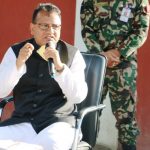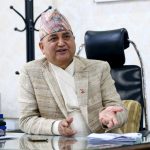 Since 1990, Nepali people have experienced multi-party democracy in the country. But there is still a confusion among the people on what ‘democracy’ means to them in their daily lives. The experience till date suggests that democracy is only for the political parties, especially for the top leaders of the so callled big parties in the country.
Since 1990, Nepali people have experienced multi-party democracy in the country. But there is still a confusion among the people on what ‘democracy’ means to them in their daily lives. The experience till date suggests that democracy is only for the political parties, especially for the top leaders of the so callled big parties in the country.
Democracy in practice means that those in power can do anything they want and everyone is free to act beyond the law of the country. It is said that no one is above the law but in Nepal this is very rarely in practice. The politics of our country is revolving around some propaganda injected by the political leaders, rather than the genuine concerns of the people.
People had high expectation from the democratic politics of the country, especially after the end of 240 years of monarchy in 2008. It was indeed great acheivement that political parties gained control over Nepal’s politics. However, parties have fialed to deliver their promies. Instead of working towards the fulfillment of people’s expectation, the new democratic politics is increasing problems. Most of the common people of Nepal have started thinking that democracy is even worse than monarchy in the country.
One of the problems of political parties is related to how they interact with one another. There is a tendency to criticize without reason. Criticizing ‘other’ parties or leaders is a key strategy for gaining popularity. Instead of criticizing policies and ideas, leaders criticize individuals or persons. They identify each other as an obstacle to the peace process or constitution making, and fail to find ways to engage with each other for common understanding.
Most of the newspapers articles these days are also filled with one political party leader criticizing other party or leaders for creating obstacles in the peace process. It is becoming a very difficult task for the common people to understand what is going on in the country. This act of criticizing ‘others’ with a hope of gaining popularity has now become an established political culture in our country. Even the common people can easily understand that it is only the criticizing the ‘others’ without any reasons. There is lack of the culture of constructive criticism among our leaders and those who are in opposition always criticize the ruling parties as if their only duty is just to criticize the ‘others’. When will these people learn that they need to use constructive criticism for the benefit of the country? When there is some constructive criticism, the related party/ leaders are not ready to accept it. Is such practice a democracy in the real sense? Human beings learn and improve from mistake but when one do not accept the mistake then how can he/she learn or improve himself/herself? It is also true that politics is about contestations and competition for power. But unfounded and unreasonable criticism are not helpful to make political gains.
Another political problem is the tendency to make and break a political party. This is usually the result of conflicts within the party, and it is seen that intra-party conflicts are more related to personality of the leaders. This is becoming very common in our country’s politics and almost all the political parties have one or another form of conflict. An extreme form of conflict is visible when a party splits.
Intra-party conflict is also linked to autocracy or totalitarianism within the party. Several instances have been found that certain person in a party want to become an autocratic leader throughout his/her life and when another person does not like this, he/she ends up with creating another party from a fraction. Moreover, the newly formed party from the fraction of the party is usually named after the surname of the leader – this is a good example of personality clashes being the main reason for party fraction.
Still another problem in Nepal’s politics is the extreme personal dreams of our leaders of becoming prime minister of the country. Every major political leader in Nepal these days want to become the prime minister of Nepal in his/her life time and does everything possible to achieve this ambition They seem to be ready to sacrifice everything in the name of fulfilling their desire of becoming prime minister. They do it by nook or by crook. Once a leader gets the opportunity to occupy certain position in the country, h/she sticks to that position. If the leaders are doing politics for fulfilling their personal dream, then what about the dream of every Nepali people who had sacrificed a lot for the political change in the country?
It seems that politics of our country is heading towards a situation of oligarchy, ruled by some political elites. The need of the present day Nepal is to develop consensus among all political parties.
How can we imagine democracy in the country ruled by undemocratic parties? When it is difficult to maintain democracy within a political party, how is it possible to maintain democracy in the country? Furthermore, how could political leaders claim themselves more democratic than others and try to convince the people that they can lead the country better?
Long back, Machiavelli stated that there is time when a ruthless and decisive ruler is better and such ruler is able to control effectively and benefit the nation than the gentle and indecisive ruler. Is Nepal waiting for what Machiavelli envisioned? It is high time that Nepal’s leaders think seriously about the future of our country and work for the country, rather than themselves. They need to know that the future Nepal and Nepali people is shaped by what they do or fail to do today. There are many ways in which democracy can be achieved in in true sense, if the political leaders are really serious about their ‘businesses’.
He is a PhD researcher in University of Waikato, New Zealand.
cls34@students.waikato.ac.nz





